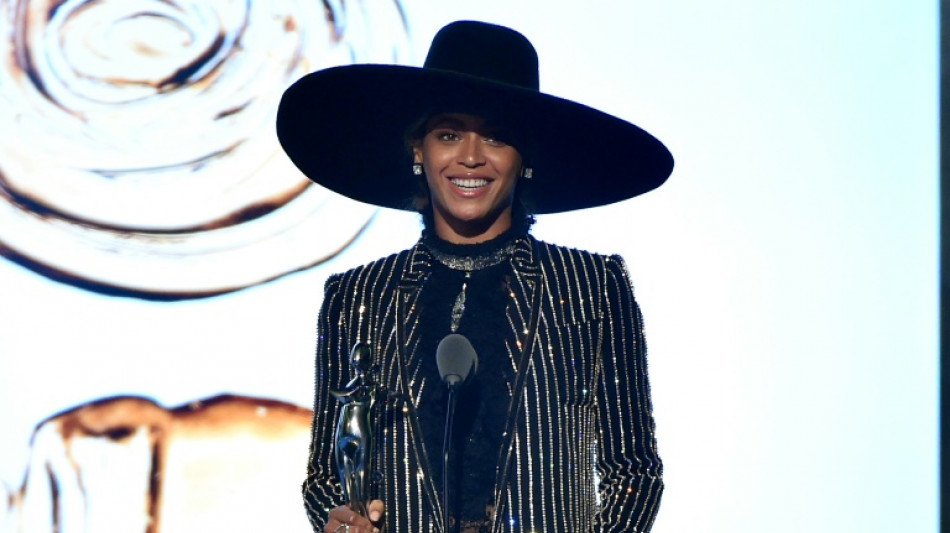

Beyonce's 'Cowboy Carter,' a history-steeped, countrified clapback
Beyonce has been a showbiz fixture for nearly three decades, but for all the caps she's worn, the Houston-bred megastar's cowboy hat has stayed within reach: Queen Bey has always been country.
And now with "Cowboy Carter" the 42-year-old Houston native has created a full-throated ode to her southern roots, a 27-track blowout of an album flavored with strings, pedal steel guitar and twang.
The second act of her "Renaissance" trilogy was already out in parts of the world where the calendar had flipped to Friday, and will continue its global drop as the clock strikes midnight across the timezones.
Prior to the new album's release Beyonce had already topped the charts with the first two singles off the album -- "Texas Hold 'Em" and "16 Carriages," dropped during February's Super Bowl.
Nevertheless, her popularity and influence -- she has more Grammy wins than any other artist in the business -- have brushed up against the overwhelmingly white, male gatekeepers of country music, who have long dictated the genre's perceived boundaries.
She notably received racist comments after performing what was then her most country song to date, "Daddy Lessons," at the 2016 Country Music Association Awards alongside The Chicks.
But Beyonce, a Texan raised by a mother from Louisiana and father from Alabama, pushed forward with her country project, whose announcement magnified a wider conversation on the long history of Black artists in country music spaces, and persistent racist backlash.
Beyonce tackled the perceived "controversy" over her full country turn on the track "Ameriican Requiem."
"They used to say I spoke, 'Too country' / Then the rejection came, said I wasn't, 'Country enough' / Said I wouldn't saddle up, but if that ain't country, tell me, what is?" Beyonce sings on the song that mashes gospel and classical rock influences, with musical allusions to the Buffalo Springfield classic "For What It's Worth."
"Tread my bare feet on solid ground for years / They don't, don't know how hard I had to fight for this."
- True to Bey -
The album is rife with references both in lyric and style, a honkified celebration of country-western's musicography and influences that's also steeped in dance, soul and funk.
And "Cowboy Carter" features signoffs from genre elders, including confirmation of a long-rumored cover of Dolly Parton's beloved "Jolene" and appearances from Willie Nelson.
Beyonce also covers Paul McCartney's "White Album" classic "Blackbiird," which she stylizes with a double-i spelling.
McCartney wrote the 1968 song about the Little Rock Nine, nine Black teenagers who became Civil Rights Movement icons when they were the first to enter a formally white-only high school in Arkansas, ushering in desegregation in the US south.
Beyonce deftly displays country's own twists over the decades, including on a psychedelic soul mashup that samples Nancy Sinatra's classic "These Boots Are Made For Walking."
And "Sweet Honey Buckiin'" incorporates hip hop and house with strums on loop, among her songs that hat-tip to the first act of "Renaissance," which celebrated electronica's Black origins and evolution.
Tanner Adell and Willie Jones, both acclaimed Black country artists, feature on "Cowboy Carter," as do Miley Cyrus -- Parton's goddaughter -- and Post Malone, a pop-rap star who has also vowed his own country album.
"Texas Hold 'Em," the album's lead single, includes Rhiannon Giddens -- who often uses her platform to emphasize the African American roots of country -- on the banjo and viola.
"Whenever a Black artist puts out a country song, the judgment, comments, and opinions come thick and fast," the Grammy-winning Giddens, who features on "Texas Hold 'Em," wrote in a recent column in The Guardian.
According to Giddens, backlash over Beyonce's latest work is not "about anything other than people trying to protect their nostalgia for a pure ethnically white tradition that never was."
Holly G, who founded the Black Opry to showcase Black artists in country three years ago, told AFP prior to the album's release that "country music fans typically like to think of themselves as traditionalists, which is a bit ironic because Black people invented country music."
"There's always that pushback when there's something new or something different coming into the space," she said. "Unfortunately for them, she's much more powerful than they are."
And no matter how Nashville reacts to "Cowboy Carter," Beyonce has made it clear she'll have the last word.
"This ain't a Country album," she posted recently.
"This is a 'Beyonce' album."
S.Moreno--LGdM




